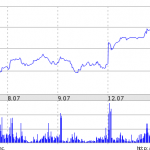gulf
By Elizabeth Grossman
It's now almost eleven months since the BP/Deepwater Horizon drilling rig exploded, killing 11 workers, and almost eight months since the damaged well was capped. While the emergency phase of this disaster is over, the assessment of and response to its long-term impacts are just now getting underway. On February 28th, the Gulf Ecosystem Restoration Task Force held the second of its five planned meetings - this one in New Orleans - and the National Institute of Environmental Health Sciences (NIEHS) launched its long-term study to evaluate health effects of the oil spill…
Quark Soup has a post comparing the spill to Niagara; and notes that the spill would be a cube ~93m on a side.
Checkling the share price (still hovering around 4.10, so neither good news nor bad) I see BP are starting to ask others to pay up for their shares. It will be interesting to see how that goes - through the courts, or quiet settlements?
Misc people complained at me when I previously said Incidentally, misc people have called this spill "unprecendented". That seems dubious (except in the traditional sense that 11 dead in Cumbria is headline news for days; 11 misc folks dead in road…
New Solutions: The Drawing Board is a monthly feature produced by the journal New Solutions. Read more about it here.
By Alice Shabecoff
As the massive oil slicks from the BP disaster continue to advance upon shores and communities, worries over the effects on wildlife and the natural environment abound, and rightfully so: hailed as the biggest oil spill in our nation's history, much of the damage is irreparable, with more inevitably to come. Yet policy makers, community members and advocates are strangely silent about another unavoidable danger: substantial harm to the children of the coast…
by Elizabeth Grossman
"I want this seafood to be safe. But I want those workers to be as safe as those shrimp and I'm not just going for funny one-liner," said Senator Barbara Mikulski (D-MD) at the conclusion of the July 15th Senate Appropriations Committee's Commerce, Justice, Science and Related Agencies subcommittee hearing on the use of chemical oil dispersants in the Gulf.
"One might say, 'Well, what's Commerce-Justice doing with public health?'" Mikulski asked rhetorically. "Well, we think [about] water quality, the impact on marine life and seafood and what these dispersants mean to…
And for BP's share price. Though in fact I came to this the other way round: the rise in BP's share price reflects a gradual re-pricing of the risk and damage extent, as well as the more recent news that the new cap-fitting seems to have gone well.
[Update: speaking of political risk - this is the kind of thing I mean -W]
[http://www.bbc.co.uk/news/world-us-canada-10654584]
We still don't have the faintest idea how much oil is spewing out of the well in the Gulf. Nor do we have the faintest idea what the full environmental consequence of what may well be the biggest single-event human-caused. ecological disaster of all time (the very fact that I have to add the word "single-event" to that statement should tell you something). We know that it is almost certainly more than all the low estimates to date, and we know that the ecological consequences will be huge, lasting and we do not understand them.
That is, we know some of the potential effects, we know they…
